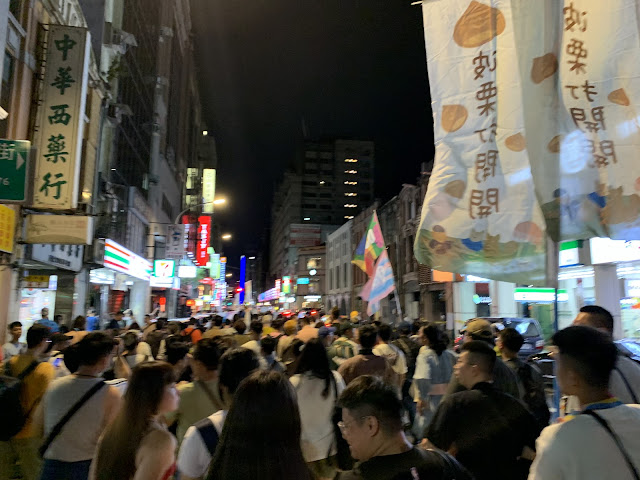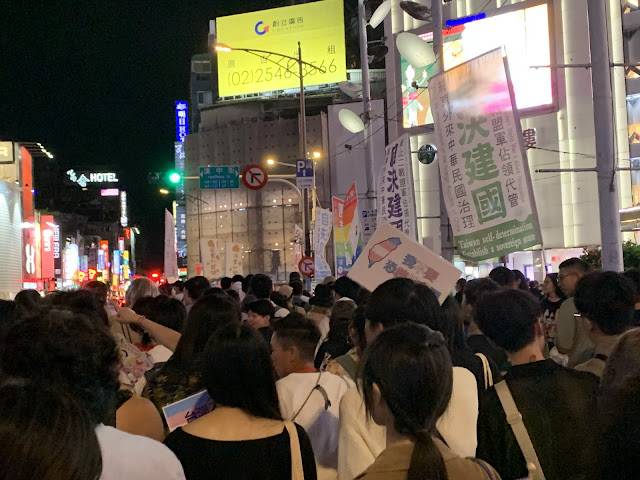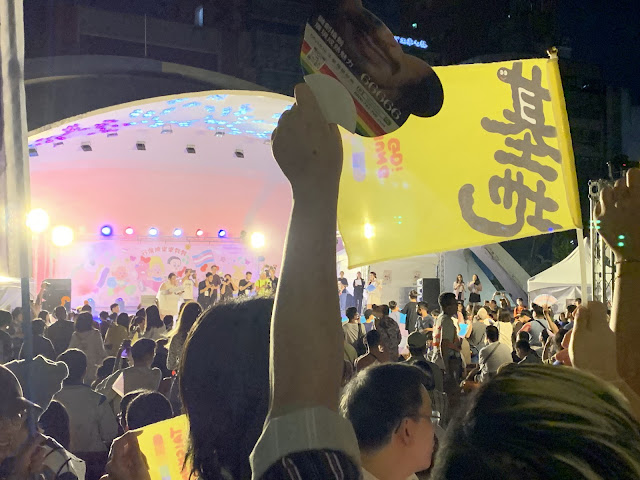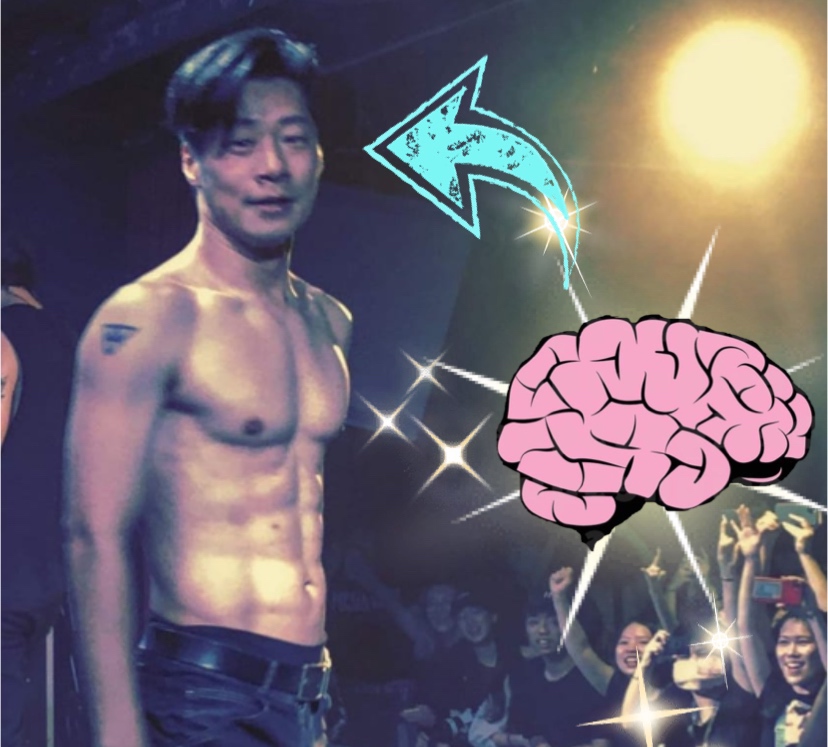Yes, of course, neither parade is 'for me', I'm the cishet lady who shows up to support the community but whose presence and opinion aren't really needed. But I'm gonna write this anyway because I just am.
Taipei Trans Pride has been held since 2019, and takes place the night before the main Pride event. Participants gather around 6:30pm -- at Red House Theater in the past, but at the amphitheater at 228 Park this year -- and set off about an hour later. I've heard differing accounts of why the start point changed, either that it can accommodate more people, or due to the significance of 228 Park in Taiwan's LGBTQIA+ history. It's probably a little of both. The route runs through Ximending, starting down Hengyang Road.
Trans Pride doesn't get much publicity, and can be almost impossible to find information about in English -- it exists, but good luck. I knew in advance and should have written about it, but didn't, so I'm not immune to that criticism either. You'll have better luck searching for 台灣跨性別遊行 (Taiwan Trans Pride Parade), which will bring you to the Taiwan Tongzhi Hotline Association event page, among others. It amuses me somewhat that UDN wrote about it in advance, but seemed more concerned with traffic routes than equality. Maybe that's a good thing, though -- let's make trans, non-binary and gender non-conforming acceptance and celebration just that utterly commonplace.
While not many sources write about the event in advance, plenty reported after the fact, including CNA, ICRT and UDN. Around 2,500 people attended -- that sounds about right, I would have guessed 3,000 -- and all performers were from the gender non-binary and diverse communities, according to Taiwan Tongzhi Hotline. These included stage hosts Shuhong and Orange and parade hosts Feifan and Viva.
If you're thinking "Feifan? Isn't he that Sunflower Movement leader?" Different Feifan. Quick side story, I once met Feifan the performer, and they told me that during the Sunflower Movement he was doing his military service, and was deployed as a guard to a government building (they told me which one, but I've forgotten). Their peers, also doing mandatory service, kept joking that they could stop the movement at any time. I found it amusing, anyway.
Some people held signs that blended international politics with trans rights, including "I don't want an independent transphobic Taiwan" (我不要恐跨的台獨, which I agree with and is also a pun on "I don't want transphobic attitudes").
Another sign said "Taiwan doesn't want Taiwan's radical advancement" -- a reference to the Taiwan Statebuilding Party (台灣基進黨), which was accused of transphobia not long ago. It's a long story and I probably don't understand enough of the details to write about it yet (if ever, but I'll try), but former party member Liu Pin-you (劉品佑) wrote a long, somewhat difficult to read post blasting Statebuilding for supporting the continued requirement of gender reassignment surgery to legally change one's gender in Taiwan.
Statebuilding's post doesn't exactly specify that they support a surgery requirement, but it's a bit weaselly -- they acknowledge the financial and health difficulties of such major surgeries, but go on to say that if the government doesn't explicitly define gender, that "women's spaces" should be determined by "sex representation", that is, one's genitalia.
Which is, of course, just another way to say that sex can be reduced to genitalia, a position I -- as a woman and vagina-haver, so the sort of woman that transphobes think should be welcome in "women's spaces" to the exclusion of others -- do not agree with. I don't want to be in exclusionary spaces regardless.
Statebuilding is getting lots of heat from the Taiwanese left on this. Good.
Anyway, I have no time for TERFs. I may have a vagina, but I don't want their "vaginas only" spaces, so let's not pretend that all cis women are in agreement on their agenda. We're not.
Back to Trans Pride.
The parade included many international participants, especially from other parts of Asia where acceptance may not be as high as Taiwan (which is hardly perfect, either). I saw Malaysian and Thai flags, and attendees came from the Philippines, Japan and elsewhere, as well.
Taiwanese human rights, LGBTQIA+, corporate supporters and political groups also attended -- a full list can be found on the Taiwan Tongzhi Hotline website. We noticed flags for the Green Party and Taihu Brewing, but they were hardly the only ones.
Hua, the organizer of Thailand's Transgender Pride Parade, was quoted on Taiwan Tongzhi Hotline's page as saying that when "transgender people can develop freely, all genders in society can benefit." I couldn't agree more. I'm cis, but honestly, I wasn't always 100% sure of that. A long internal dialogue was necessary for me to come to that conclusion, and increasing dialogue about and acceptance of gender diversity gave me not just the lexical resource but the confidence to have that conversation with myself. In the end I realized I was the gender I was assigned at birth, but the process was deeply beneficial, helping me to better understand and be myself.
Specifically, this personal experience has taught me that increasing acceptance of transgender people and open-minded discourse on these issues also increases acceptance of gender non-conforming preferences even among cisgender people like myself. Despite greater theoretical freedom to be oneself -- from laws that don't allow employers to discriminate based on gender to basic access to things like healthcare (still a battle) and bank accounts -- there are still a lot of bitter idiots who believe men should think, act and be one way, and women another. Hell, the Republican presidential nominee, who happens to be a rapist, and his weird minion who isn't a rapist as far as I know, but has some extremely scary views on women, seem to think as much.
As a woman with a loud mouth who prefers cats over children, I've come to realize that greater transgender acceptance and embracing the infinite diversity of people, personalities and preferences regardless of their genitalia fuel each other -- and yes, that does benefit all of us.
The fight is far from over, though. To legally change one's gender in Taiwan, one must undergo both psychiatric and gender reassignment surgery, which are massive barriers. As someone who doesn't think her vagina is what makes her a woman and has witnessed societal discrimination against not just cis women but gender non-conforming people as well, I just don't think surgery should be the bar.
As a cis woman, I am not just happy but enthusiastic to welcome trans women, including those who haven't had surgery, into women's spaces. I don't think merely having a penis (or not having a vagina) makes a person unsafe in such a space.
In fact, I don't want to be in spaces that don't welcome them as well.
This is improving in Taiwan, with court cases such as those of Xiao E and Nemo, ruling that they did not have to provide proof of surgery. Nemo in particular was unable to undergo this surgery, whereas in Xiao E's case, the court found that the Ministry of the Interior's requirement of reassignment surgery violated both an abstract legal principle (reservation of statutory power) and violated such persons' right to "health, personal traits, and human dignity."
Societal discrimination is still a problem, as is discrimination against transgender people within the greater alphabet community. At Pride, one may unfortunately still come across people who talk about LGBTQIA+ acceptance and, well, pride -- but leave out the "T" in that acronym. I'm not really qualified to talk more about this as I'm not really part of either community, but I know it exists. I've witnessed it personally, and it's disheartening.
To be honest, it was also a lot more fun to walk through Ximending at night rather than from City Hall down Ren'ai Road on a hot day, although I know it can be hard for people to make it to the Friday event after work. The numbers were more manageable as well. The main Pride event matters, of course, and I attended that too. But it's a hell of a lot easier to walk on a balmy evening with 2,500 people. Still, let's hope it's even more next year.
All in all, I was happy for the chance to walk in solidarity at Trans Pride. I know I don't get to label myself an ally, but it's what I want and hope to be. An imperfect person who just wants to be herself, let others be who they are, erase whatever residual discriminatory tendencies or beliefs I might still have lurking in my subconscious, and be part of a more accepting world.

















